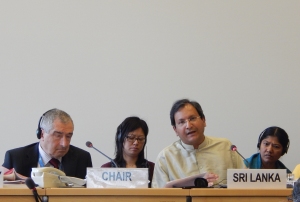
Sri Lanka's Permanent Representative to the UN in Geneva and Leader of the Sri Lanka delegation to the Human Rights Committee Ambassador Ravinatha Aryasinha asked the Human Rights Committee to “judge Sri Lanka in proportion to the challenges Sri Lanka has continued to face as a country emerging from a 30 year terrorist conflict".
The Ambassador made this observation in responding to comments made during the consideration of Sri Lanka's 5th Periodic Report under the International Covenant on Civil and Political Rights (ICCPR) by the Human Rights Committee, which was held on 7-8 October 2014 in Geneva. The Human Rights Committee comprises a body of independent experts from 18 countries that monitors implementation of the International Covenant on Civil and Political Rights by its State parties.
Responding to a question raised by the Committee as to why the PTA is still in existence in Sri Lanka, Ambassador Aryasinha said Sri Lanka does not shy away from making considered choices and is adept at differentiating, in the best interest of its people. He recalled that notwithstanding security concerns, the government had speedily resettled almost all internally displaced persons, that out of approximately 12,000 LTTE ex-combatants who have been reintegrated into society, all but 114 are undergoing rehabilitation, and 84 are under legal proceedings, and that in 2011 the government had allowed emergency to lapse, which at the time many felt was too hasty. In spite of concerns raised, the Government of Sri Lanka had taken these calculated risks. He said, the government had to keep the PTA in effect, albeit reluctantly, due to recent incidents pointing to attempts at the resurgence of terrorism in Sri Lanka with involvement of external networks. He pointed out that such caution was also taken by many governments who have had to face the threat of terrorism.
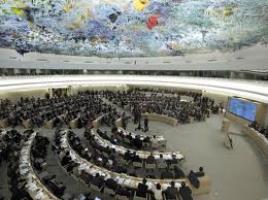
Twenty-two developing countries of the Like Minded Group (LMG) in Geneva, in a joint statement made through its Chair - Egypt, have said the Group "believes that the intrusive mandate given to the OHCHR by Res. 25/1 to carry out investigations on Sri Lanka is unwarranted, especially in the context where the country is implementing its own domestic processes". It said "OHCHR's efforts should contribute to a state's own efforts in the promotion and protection of human rights, as stipulated in the UNGA Res. 48/141, UNGA Res. 60/251, UNGA Res. 65/281 and in the IB package. These core documents do not confer any oversight authority to the OHCHR over sovereign countries. Any external assistance to countries should expressly be in consultation with and with the consent of that country". It also noted that "however, in contravention of these fundamental principles, Resolution 25/1 calls for 'comprehensive investigation' by the OHCHR, thereby vesting an investigative authority on the office". It said, "as we have observed, successive resolutions on Sri Lanka have not enjoyed the consensus of the Council members. This was amply evident by the divided vote of 14 against, 10 abstentions on OP 10 of resolution 25/1, which sought to establish the OHCHR investigation". The statement added "the international community should be mindful not to jeopardize the delicate process of reconciliation that is already underway in Sri Lanka".
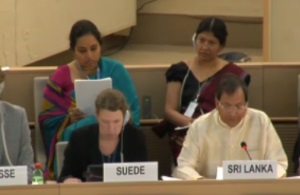
Responding to the ‘Oral Update’ on Sri Lanka by the High Commissioner for Human Rights at the Human Rights Council (HRC) in Geneva today (25 September 2014), Sri Lanka’s Permanent Representative to the United Nations in Geneva, Ambassador Ravinatha Aryasinha said “the Government of Sri Lanka does not wish to help legitimize a flawed process and have a detrimental precedents established”, and hence “has to respectfully refuse those who urge that Sri Lanka cooperate with the OHCHR investigation.”
He said this position has been taken after much consideration and represents not only the will of the Sri Lankan people as reflected in the motion recently adopted in the Parliament with an overwhelming majority, but also the majority within the Human Rights Council, who refused to support Operational Paragraph 10 of HRC resolution 25/1 which created an OHCHR investigation on Sri Lanka in March 2014.
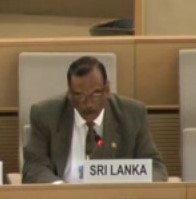
Sri Lanka believes that the only way to achieve success in the process of drafting a Declaration on right to peace should be through consensus, based on established principles of international law.
Sri Lanka made this observation at the General Debate under Agenda Item 5 on the Report of Inter-Governmental Working Group on the Right to Peace at the 27th Session of the Human Rights Council in Geneva.
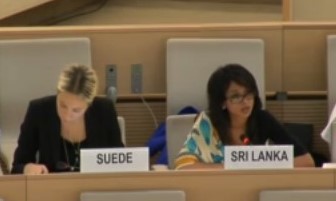
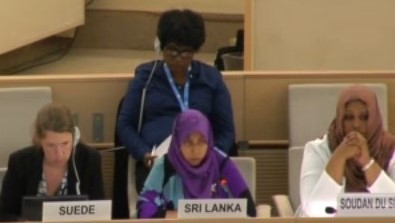
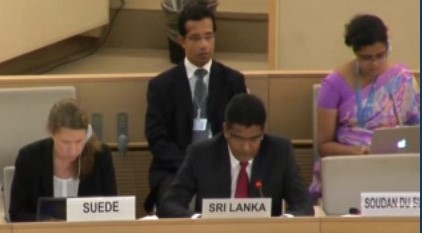
- Unilateral coercive measures hinders the fostering of a democratic and equitable international order
- Sri Lanka fully committed to address the increasing challenges of the ageing population
- Sri Lanka responds during discussion on UN High Commissioner's Report to the 27th Session of the Human Rights Council
